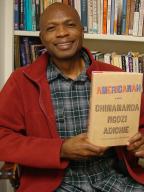
Late this summer I began reading the newest novel from the Nigerian author Chimamanda Ngozi Adichie. Americanah follows its twenty-something female protagonist, Ifemulu, as she travels from her solidly middle-class Nigerian home to the United States, where she eventually attends Princeton University on an academic fellowship. Along the way, Ifemelu interacts with a broad cast of characters – some of them from Nigeria as well as other African countries such as Mali and Senegal, and many more from the United States. Adding to Ifemulu’s overall sense of displacement is the fact that she continues to pine away for an old boyfriend who, now married, remains in Nigeria. Over the course of the narrative, the protagonist makes a series of shattering discoveries, both about herself, as well as about the two countries she finds herself traveling between, in body and spirit. Two events conspired to encourage me to pick up Adichie’s novel: 1) I read an effusive write up one weekend in the New York Times Book Review, and 2) one evening I happened to hear Terry Gross interview Adichie on NPR’s long-running “Fresh Air” radio program. I’m a Terry Gross junkie! Over the years I’ve come to realize that I enjoy hearing writers talk about their work, the initial inspiration as well as the creative process of writing itself. Such personal insights make the writing come alive for me in a way that’s wholly different when I don’t know anything about the author. Plus, anyone who knows me well knows that I’m drawn to autobiographical fiction, and it quickly became apparent to me when I listened to the NPR interview that Adichie’s newest novel was indeed autobiographical, something I gather is true of much of her writing. For example, in response to several of Terry Gross’s characteristically well-phrased inquiries into Adichie’s own unique experiences as a “Non-American Black” in the U.S., a term the novel’s protagonist coins for an entertaining blog she begins writing upon her arrival to Princeton, Ms. Adichie would often reply, “Oh, yes. That [personal experience] was something I put in my novel!” Not that the interview left me with the impression that Americanah is simply a collection of real-life anecdotes the author has transcribed verbatim and called it a novel. Quite the contrary. The inventive formal structure of the book – Adichie uses flashbacks creatively and dialectically throughout the narrative to draw the two dissimilar worlds together, the U.S. and Nigeria – has the effect of encouraging the reader to make repeated surface comparisons between the two countries and their respective citizens. With this back-and-forth narrative strategy, Adichie seems to want to position all of us readers as active participants – much like the involuntary back-and-forth head movements characteristic of the experience of watching a tennis match – in the construction of various stories, or mythologies, that make up the broad cultural assumptions those in one country, say, the U.S., might hold about those in another country, say, Nigeria. But it’s important to note, too, that the novel is keen to place the stories or mythologies that Nigerians hold about America and Americans – many of them true, other inflated – equally under scrutiny as well. As a result, some of these mutual assumptions we Americans may hold about Nigerians or those Nigerians may hold about us are dismantled completely, while others, in their uncomfortable and messy truths, are profoundly more complicated. All in all, I found Americanah to be a winning novel.


Thanks Mark. I met her through TED and have wanted a reminder.
http://www.ted.com/talks/chimamanda_adichie_the_danger_of_a_single_story.html